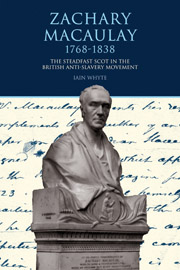Book contents
- Frontmatter
- Contents
- Foreword
- Acknowledgements
- Abbreviations
- List of Illustrations
- Chronology
- Introduction
- 1 From Inverary to the Sierra Leone River
- 2 Slave Traders and French Invaders
- 3 Captive in Love—to Selina Mills
- 4 The Trials of the Governor
- 5 Caught in a Multitude of Tasks
- 6 Clapham, Family and Friends
- 7 Attempting to Win France for Abolition
- 8 ‘Let Us Look it Up in Macaulay’—The Anti-Slavery Arms Manufacturer
- 9 Commerce and Conflict
- 10 Triumph and Tragedy on the Path to Glory
- 11 As Others Saw Him—As We Might Assess Him
- Bibliography
- Index
Foreword
- Frontmatter
- Contents
- Foreword
- Acknowledgements
- Abbreviations
- List of Illustrations
- Chronology
- Introduction
- 1 From Inverary to the Sierra Leone River
- 2 Slave Traders and French Invaders
- 3 Captive in Love—to Selina Mills
- 4 The Trials of the Governor
- 5 Caught in a Multitude of Tasks
- 6 Clapham, Family and Friends
- 7 Attempting to Win France for Abolition
- 8 ‘Let Us Look it Up in Macaulay’—The Anti-Slavery Arms Manufacturer
- 9 Commerce and Conflict
- 10 Triumph and Tragedy on the Path to Glory
- 11 As Others Saw Him—As We Might Assess Him
- Bibliography
- Index
Summary
The influence of Scots throughout the Empire is well known and fully documented. Missionaries, doctors, teachers, engineers, administrators were supplied in abundance. President Julius Nyerere of Tanzania and President Kenneth Kaunda of Zambia always gave me an especially warm welcome because I was Scottish, and they loved to speak—as did many others—of their education at the hands of Scots. An old joke which I use is that there was no such thing as a British Empire, just a Scottish one to which the English attached themselves.
Yet there was a darker side to this diaspora. A few years ago I read James Robertson's powerful novel Joseph Knight, based on the true story of the West Indian slave whose owner brought him back to Scotland where, after a case that went all the way to the appeal judges in the Court of Session, he won his freedom. The sad truth is that many Scots families grew rich from the slave-driven sugar plantations.
The story of the abolition of the slave trade has its famous standard-bearers: William Wilberforce, David Livingstone and others. Iain Whyte has researched the lesser known Zachary Macaulay. This Argyllshire son of the manse has stayed relatively obscure, though his son became the celebrated historian and colonial administrator, Lord Macaulay.
The author presents a compelling picture of this evangelist, campaigner, journalist, and administrator whose contribution to the abolitionist cause was truly substantial. Macaulay was the founder and first editor of the Anti-Slavery Monthly Reporter, which not only provided detailed information on slavery for the Parliamentary campaign but instructed and energised local committees to keep moral and political pressure on those in power, akin to the Anti-Apartheid news of much more recent times.
- Type
- Chapter
- Information
- Zachary Macaulay 1768-1838The Steadfast Scot in the British Anti-Slavery Movement, pp. ixPublisher: Liverpool University PressPrint publication year: 2011

